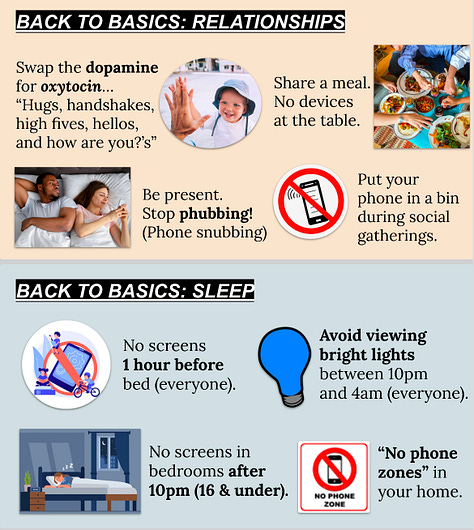Community versus competition
A few notes about the difference between acting communally versus competitively.
At the end of every week, I’ll send you a list of things I’m noticing. Something creative, reflective, or practical which may include some things I’m thinking about, my favourite pieces of art, and any books or articles I’m reading. This week, I’m thinking about the difference between community and competition.
Thoughts about community have been coming up for me recently. I keep asking myself this question as I navigate new cycles of growth:
Am I acting communally or competitively?
I’m a big questions person. I ask a lot of questions and I don’t shy away from trying to answer them honestly. Those who know me well know my curious nature and know I love deep conversation. I also care deeply about others and I value my people.
Here are some questions I’m reflecting on this week. You can use them as a point of self-reflection or you can use them as journal prompts:
Am I acting communally or competitively?
Why do I default to competition before I think to deepen my community?
Am I trying to win a competition that doesn’t exist?
Where does winning get me and does community offer the same rewards?
Where does the quest for competition come from?
Do I really need to be the best or can I let my best be good enough?
Am I comparing and competing with people who don’t know I’m comparing and competing with them?
Am I competing with others or with myself?
When am I most likely to act competitively instead of communally?
Do I keep the score with others in order to find evidence of how I measure up?
Can my need for competition be channeled and fuelled into healthier pursuits?
What would it mean to pursue community over competition?
Is competition our default mode?
In today’s world, I question where this desire to compete comes from. I catch myself doing it and I see others doing it too. We are a culture that needs to win, be the best, and receive positive praise. It won’t be shocking to you that I also wonder about how the internet and mobile apps train us to be more competitive and less communal.
I find the contrast between community and competition an important aspect of Western culture (and, quite frankly, global internet culture) to talk about because it helps us reflect on our own behaviour while forcing us to consider how we show up in relationship with others. I wonder what behaviours are core features of our species and what norms, ideas, and patterns are taught or passed down through culture and upbringing.
Despite it being its core promise, I don’t think a culture of competition allows us to thrive. If you find yourself acting competitively, you may find yourself constantly fighting to defend yourself or trying to win competitions that don’t actually exist. It might also be making you more angry, stressed, and depressed to live from a place of needing to compete in order to measure up or demonstrate your worthiness.
Being competitive may help you access your needs under capitalism and may even create some success in your life. But competition also creates unnecessary stress and can add an unneeded strain on our relationships with others. In the longterm, this can lead to an increase in lonely feelings, as I see time and time again in my therapy practice. Competing with others does not always give us space to connect more deeply with others.
Competition isn’t all bad, right?
There are many examples of how competition can be healthy, such as through sports, play, and even creative rivalries. A competitive nature is fine when the environment calls for a steady dose of competitive spirit. Many of us love watching competitions play out except when we’re losing. Competition has been so normalized in this culture that we’ve developed many rational arguments for its existence: we use the debate stage to figure out who’s the most correct (why?), we argue with strangers on Twitter (…why?), and we compete against others to grow and build a larger follower base (…no, seriously, WHY!?). What is all this for?
Sometimes competition is unhealthy, especially when there is no rational argument for why we do it. In my view, it is most unhealthy when it causes us to go rogue in relationships or when it convinces us that we have to do everything on our own. In the short term, a competitive spirit can be fruitful and fun, but long bursts of the lone wolf approach might have us convinced it is not safe or necessary to need others. We might even come to depend on no one.
Research highlights the strength of doing things together. A communal approach is not just efficient (many hands make light work!), but it also offers us a sense of camaraderie and togetherness. From an attachment perspective, it also sets the stage for healthy relating by helping us develop the ability to self-regulate and build our own capacity for individuality. The dependency paradox states that in order to become a confident and connected individual, we must first pass through the gates of a safe relationship. That is, the more connected we are in relationships, the more connected we become with ourselves and our inner universe. The more interdependent we are, the more independent we become.
This is all to say that we are strongest when we are working together. There is strength that comes from a life of leaning into community. We are communal by nature and need one another to survive and thrive. There is ample research which supports these conclusions; growing up in safe and loving households predicts stable later-life mental health and early communal rearing even gives mice a competitive edge as they get older.
Acting in community with one another requires us to choose togetherness over hyper-independence and to choose each other instead of opting into loneliness. It asks us to abandon unhealthy forms of competition in order to enhance our experience of belonging with one another.
We need each other,
Jake
Some things I’m noticing this week:
Way too much news about TikTok to realistically process and keep track of:
Canada bans TikTok from government devices, joining the US and EU.
TikTok announces daily screen time limit for users under 18 to one hour.
The controversy of TikTok's latest trending beauty filter, Teenage Look.
TikTok CEO, Shou Zi Chew, will testify before congress in March 2023
TikTok takes 8 minutes to start pushing girls eating disorder content.
Oh, and Meta is in the news too:
In better news…! I had the most amazing, rejuvenating, and inspiring time at the Thrive Summit in Costa Rica. A big thank you to Megan Gunnell and team for hosting me and being so welcoming. I am grateful to be in community with you!






At the Summit, I also spoke about teens, social media, and how we can all benefit from changing our relationship with our screens and devices. Here are some photos from my talk:








